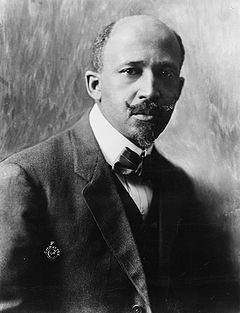William Edward Burghardt Du Bois was born three years following the Civil War, on February 23, 1868, in Great Barrington, Massachusetts. His paternal side was French, settling in America in 1674 and, the Burghardts’, his maternal side, were descendants of slaves who fought in the Civil War.
William’ father died when he was a child and was reared by his mother, and judgmental aunts. Massachusetts was predominately  white and so were Du Bois friends. As William grew he realized some people thought that his black skin was a disadvantage. In high school, his teachers encouraged him as a student and school work always came easy to him. Du Bois excelled in Latin and Greek and participated in active discussions about the meaning of Love and Life. At the age of 15, William began to write weekly columns in the New York Globe and Springfield Republican.
white and so were Du Bois friends. As William grew he realized some people thought that his black skin was a disadvantage. In high school, his teachers encouraged him as a student and school work always came easy to him. Du Bois excelled in Latin and Greek and participated in active discussions about the meaning of Love and Life. At the age of 15, William began to write weekly columns in the New York Globe and Springfield Republican.
Attending Harvard was W.E.B.’s longtime dream, however after receiving a scholarship to Fisk University in Nashville he gladly accepted. Du Bois was amazed by the South, he felt a home on the campus of Fisk. William had never been surrounded by fellow blacks, and he began to understand the plight of the Negro. He enjoyed concerts given by Fisk’s Jubilee Singers, giving him faith about blacks, and how they will have a better life to come. However, after visiting back home he saw that Tennessee deprived Negroes of citizenship rights, and that Negroes were the blunt of jokes. W.E.B. realized the discrimination and knew something had to happen to improve the lives of Negroes. “I am a Negro, and I glory in the name!,” claimed Du Bois in one of his pep speeches at Fisk.
Upon graduation at Fisk, William received a scholarship to Harvard. He never felt as if he belonged at Harvard as he had at Fisk. While at Harvard Du Bois was not allowed to join clubs and dances due to his skin color. With his background and study in philosophy, W.E.B. was driven to write The Suppression of the African Slave- Trade. This was the first volume in the Harvard Historical Series, and William was the first Negro to receive a Doctor of Philosophy degree from Harvard.
Although Du Bois was qualified for any teaching position, no white university would hire him. After a two year fellowship in Europe, he obtained a teaching position in Latin and Greek at Wilberforce, in Ohio. Two years were spent at Wilberforce, when William married Nina Gomer.
The University of Pennsylvania asked Du Bois to do a study of the Negroes of Philadelphia. After living in the slums of Pennsylvania, he published Philadelphia Negro about the lifestyle of a Negro in Philadelphia. Du Bois spent the next 13 years teaching history and economics at Atlanta University, writing many books including: The Negro in Business, The Negro Artisan, Notes on a Negro Crime, and many others. All his books at this time dealt with Negro history and their living conditions in the late 1890’s to 1910’s.
In 1900, W.E.B. Du Bois attended the first Pan-African Conference in London. After attending the conference in London, he later created the Pan-African Conferences in the United States and in Europe. For this extraordinary accomplishment, he received the Springarn Medal in 1920.
Booker T. Washington felt that Negroes should gain rights slowly, however Du Bois wanted immediate rights for the Negro. The split between Washington and Du Bois reflected a bitter division of opinion among these two prominent black leaders. In 1905, at Niagara Falls, Canada, Du Bois joined the more militant leaders to demand equal voting rights and educational opportunities for blacks and an end to racial discrimination. However the Niagara Movement lost momentum within a few years, when he helped form another group, in 1910 which became the National Association for the Advancement of Colored People. He edited the NAACP’s journal, the Crisis, in which he often wrote that blacks should develop farms, industries, and businesses separate from the white economy. NAACP officials, who desired integration, criticized his opinion, and he eventually resigned as editor in 1934. He returned to Atlanta University, and in 1939 launched Phylon, a new magazine about blacks’ lives.
W.E.B. wrote many books while most notably The Souls of Black Folk that was a collection of essays promoting black leadership in the government. His other works include Black Reconstruction, Dusk to Dawn, and The Autobiography of W.E.B. Du Bois.
Later, Du Bois believed that the United States could not solve its racial problems and that the only country opposed to racial discrimination was the Soviet Union. He was awarded the Communist-sponsored International Peace prize in 1952 and the Soviet Lenin Peace prize in 1958. Du Bois joined the Communist party of the United States in 1961 and emigrated to Ghana, where he became a citizen, in 1963. “My great-grandfather was carried away in chains from the Gulf of Guinea,” he said, “I have returned that my dust shall mingle with the dust of my forefathers.” Du Bois died in Ghana on Aug. 27, 1963.
